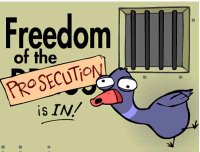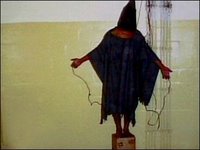Monday, October 30, 2006
Saturday, October 28, 2006
Worldwide Press Freedom Index 2006
 New countries have moved ahead of some Western democracies in the fifth annual Reporters Without Borders Worldwide Press Freedom Index, issued today, while the most repressive countries are still the same ones.
New countries have moved ahead of some Western democracies in the fifth annual Reporters Without Borders Worldwide Press Freedom Index, issued today, while the most repressive countries are still the same ones.The three worst violators of free expression - North Korea, bottom of the Index at 168th place, Turkmenistan (167th) and Eritrea (166th) - have clamped down further. The torture death of Turkmenistan journalist Ogulsapar Muradova shows that the country’s leader, “President-for-Life” Separmurad Nyazov, is willing to use extreme violence against those who dare to criticise him. Reporters Without Borders is also extremely concerned about a number of Eritrean journalists who have been imprisoned in secret for more than five years. The all-powerful North Korean leader, Kim Jong-il, also continues to totally control the media.
Northern European countries once again come top of the Index, with no recorded censorship, threats, intimidation or physical reprisals in Finland, Ireland, Iceland and the Netherlands, which all share first place.
The United States (53rd) has fallen nine places since last year, after being in 17th position in the first year of the Index, in 2002. Relations between the media and the Bush administration sharply deteriorated after the president used the pretext of “national security” to regard as suspicious any journalist who questioned his “war on terrorism.” The zeal of federal courts which, unlike those in 33 US states, refuse to recognise the media’s right not to reveal its sources, even threatens journalists whose investigations have no connection at all with terrorism.
Freelance journalist and blogger Josh Wolf was imprisoned when he refused to hand over his video archives. Sudanese cameraman Sami al-Haj, who works for the pan-Arab broadcaster Al-Jazeera, has been held without trial since June 2002 at the US military base at Guantanamo, and Associated Press photographer Bilal Hussein has been held by US authorities in Iraq since April this year.
You can read the full report and find your own countries position on the list Here
Hunting Bin Laden?
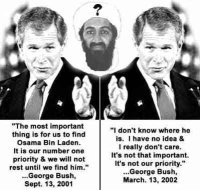 By Michael Smerconish
By Michael SmerconishHAVE THE BRAKES been put on the hunt for Osama bin Laden? Just back from the CENTCOM region, that is my hunch.
The effort to find bin Laden was one of the many questions I had about the war on terror as I joined a Pentagon-sponsored military immersion program called the Joint Civilian Orientation Conference...
...I want to be clear here: Nowhere did anyone ever tell me the search for bin Laden is over. But I am worried that the days of aggressively hunting him have ended. I say that based on the lack of response to my repeated questions in the context of other sensitive briefings, the fact that the CIA reportedly closed its bin Laden desk, called the Alec Station, and the agreement reached between Musharaf and tribal leaders in the Northwest part of his nation wherein he has agreed to give them continued free rein.
Read the full article Here
An interesting read that asks the poignant questions regarding the status of the hunt for Bin Laden.
HT to Nostradamnthem
Thursday, October 26, 2006
Wednesday, October 25, 2006
History repeating

I have watched a documentary about the 1956 'Suez Crisis'. The Suez Canal was in British hands when Nasser decided to take it over and nationalise it. As Nasser had recieved arms from the Soviet Union (though he was an anti-communist who had communists arrested and detained), British PM Anthony Eden claimed Nasser was a Soviet ally. For this, he used 'information' from the secret services. Information which was false. At the same time, and somewhat paradoxically, Nasser was accused by Eden of being a fascist. Eden decided to get rid of Nasser, ie. to operate a regime change in Egypt. As the US tried to appease Britain, the latter and France came to a secret agreement with Israel in Sèvres, France, that Israel would stage a fake invasion of the Sinaï, which would gave an excuse to Britain to set an ultimatum to Egypt and Israel to stop hostilities. Israel would obviously withdraw, while Egypt's Nasser could not accept the ultimatum therefore allowing Britain and France to intervene. When war broke out between Egypt, Britain and France, Eden claimed he was 'utterly convinced' of the just nature of his war. After a short and disastrous war, based on lies, Eden resigned. Does any of this sound familiar? In those days, information was far less available to the public than it is today. Today, the lies and manipulation of 'our' leaders come to light much quicker. The question I ask myself is, how much time has to pass before the truth becomes historical fact?
The demographic solution

The following extract is from an article by Meron Benvenisti in Ha'aretz. He was deputy mayor of Jerusalem and also an advocate of a binational state.
No one mentions the fact that the "demographic balance" is fundamentally fictitious. It was created through a manipulation of Jerusalem's borders in 1967, based on the principle of preserving a minimum of Arabs and a maximum of land for Jews. In the name of this principle, more and more exposed or dispensable hilltops have been annexed to the city since 1967 and anointed with the holy oil of the Eternal City.
Coup against Maliki reported in the making
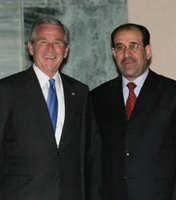 Iraqi army officers are reportedly planning to stage a military coup with U.S. help to oust the government of Prime Minister Nouri al-Maliki.
Iraqi army officers are reportedly planning to stage a military coup with U.S. help to oust the government of Prime Minister Nouri al-Maliki.Cairo-based Iraqi and Arab sources said Monday several officers visited Washington recently for talks with U.S. officials on plans for replacing Maliki's administration by a "national salvation" government with the mission to re-establish security and stability in Iraq.
One Iraqi source told United Press International that the Iraqi army officers' visit to the United States was aimed at coordinating the military coup in case the efforts of Maliki's government to restore order reached a dead end.
He said among the prominent officers were the deputy chief of staff, a Muslim Shiite, the intelligence chief, a Sunni, and the commander of the air force, a Kurd. It is believed the three would constitute the nucleus of the next government after the army takes over power.
The proposed plan, according to the source, stipulates that the new Iraqi army, with the assistance of U.S. forces, will take control of power, suspend the constitution, dissolve parliament and form a new government. The military will also take direct control of the various provinces and the administration after imposing a state of emergency.
An Arab source also told UPI that certain Arab countries were informed of the plan and requested to offer their help in convincing the former leaders of the deposed Baath Party regime residing in their countries to refrain from obstructing the move and stop violence perpetrated by the party in Iraq. In return, they will be invited to participate in the government at a later stage.
Washington is becoming increasingly impatient with the failure of Maliki's government in quelling sectarian violence threatening to plunge Iraq in an all-out civil war.
Source
Tuesday, October 24, 2006
Bush: ‘We’ve Never Been Stay The Course’
 During an interview today on ABC’s This Week, President Bush tried to distance himself from what has been his core strategy in Iraq for the last three years.
During an interview today on ABC’s This Week, President Bush tried to distance himself from what has been his core strategy in Iraq for the last three years.George Stephanopoulos asked about James Baker’s plan to develop a strategy for Iraq that is “between ’stay the course’ and ‘cut and run.’”
Bush responded, ‘We’ve never been stay the course, George!’ Watch it:
Source : Think Progress
Unbelievable
Iraq : The real story
 Watch this haunting observational film that explodes the myth around the claims that the Iraqis are preparing to take control of their own country.
Watch this haunting observational film that explodes the myth around the claims that the Iraqis are preparing to take control of their own country.Contains some strong language ( Flash presentation 8 min's 10 seconds )
Here
Seven in Ten Americans Favor Congressional Candidates Who Will Pursue a Major Change in Foreign Policy
 Going into the November midterm elections, seven in ten Americans say they prefer Congressional candidates who will pursue a new approach to U.S. foreign policy.
Going into the November midterm elections, seven in ten Americans say they prefer Congressional candidates who will pursue a new approach to U.S. foreign policy.A new nationwide survey finds a large and growing majority of Americans is dissatisfied with the position of the United States in the world. Most Americans believe that U.S. policies are increasing the threat of terrorist attack and decreasing goodwill toward the United States.
The Program on International Policy Attitudes (PIPA)/Knowledge Networks poll also finds that large majorities of Americans feel that the United States puts too much emphasis on military force and unilateral action. Most say they want their member of Congress to work to shift the emphasis of U.S. foreign policy in favor of diplomacy, multilateral cooperation, and homeland security.
They also stress the need for programs to reduce the United States’ dependence on oil. When given the opportunity to reshape the foreign policy budget, respondents redistribute spending from military programs to other methods of pursuing security.
“It is a rare year that foreign policy takes center stage in Congressional elections. Voters are calling for a sea change in U.S. foreign policy. They want less emphasis on military force, and more on soft power,” said Steven Kull, director of PIPA and editor of WorldPublicOpinion.org.
On the question of how to deal with the nuclear ambitions of Iran and North Korea, a majority of respondents disagrees with the Bush administration’s refusal to seek direct talks. Fifty-five percent say the United States should enter into talks without preconditions.
Continue reading at the Source
The Way the World Ends
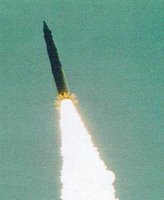 With all the hype about North Korea, we're forgetting that the world is still staring down the barrels of thousands of U.S. and Russian ICBMs
With all the hype about North Korea, we're forgetting that the world is still staring down the barrels of thousands of U.S. and Russian ICBMsby Helen Caldicott
It is difficult to underestimate the problems associated with North Korea's recent nuclear weapons test. Following a small atomic explosion in a mountainous area of North Korea of less than one kiloton -- the Hiroshima bomb was 13 kilotons -- the U.S. administration is encouraging draconian economic sanctions to be enacted against a desperately poor country where millions of people are malnourished and that will further ostracize a paranoid regime, while the rest of the world looks on with horror as the nuclear arms race threatens to spiral out of control.
While lateral proliferation is indeed an incredibly serious problem as ever-more countries prepare to enter the portals of the nuclear club, one consistent outstanding nuclear threat that continues to endanger most planetary species is ignored by the international community.
In fact, the real "rogue" nations that continue to hold the world at nuclear ransom are Russia and the United States. Contrary to popular belief, the threat of a massive nuclear attack -- whether by accident, human fallibility or malfeasance -- has increased.
Of the 30,000 nuclear weapons in the world today, the United States and Russia possess 96 per cent of them. Of these, Russia aims most of its 8,200 strategic nuclear warheads at U.S. and Canadian targets, while the U.S. aims most of its 7,000 offensive strategic hydrogen bombs on Russian missile silos and command centres. Each of these thermonuclear warheads has roughly 20 times the destructive power of the bomb dropped on Hiroshima, according to a report on nuclear weapons by the National Resources Defense Council, a U.S. environmental group.
Of these 7,000 U.S. strategic weapons, 2,500 are deployed on intercontinental ballistic missiles that are constantly maintained on hair-trigger alert ready for immediate launching, while the U.S. also maintains some 2,688 hydrogen bombs on missiles in its 14 Trident submarines, most ready for instantaneous launching.
According to the Center for Defense Information, a group that analyzes U.S. defence policy, in the event of a suspected attack, the commander of the U.S. Strategic Air Command has only three minutes to decide if a nuclear attack warning is valid. He has 10 minutes to locate the president for a 30-second briefing on attack options, and the president then has three minutes to decide to launch the warheads and to consider which pre-set targeting plan to use.
Once launched, the missiles would take 10 to 30 minutes to reach their Russian targets.
An almost identical situation prevails in Russia, except unlike the combined U.S. and Canadian NORAD early-warning equipment, the Russian system is decaying rapidly, its early-warning satellites are almost non-functional and it now relies on a relatively primitive over-the-horizon radar to warn it of an imminent secret first-strike attack from the United States.
The Russian military and political leaders are suitably paranoid about this extraordinary post-Cold-War situation. So much so that in January 1995 president Boris Yeltsin came to within 10 seconds of launching his nuclear armada when the launch of a Norwegian weather satellite was misinterpreted in Moscow as a pre-emptive U.S. nuclear attack.
Most towns and cities with populations over 50,000 on the North American continent are targeted with at least one hydrogen bomb. Only 1,000 bombs exploding on 100 cities could induce nuclear winter and the end of most life on earth. There are fewer than 300 major cities in the Northern hemisphere.
Continue reading at the Source
Saturday, October 21, 2006
World against torture
 Nearly a third of people worldwide support the use of torture against terror suspects in some circumstances, a BBC survey suggests.
Nearly a third of people worldwide support the use of torture against terror suspects in some circumstances, a BBC survey suggests.Over 27,000 people in 25 countries, including Israel , were asked if torture was acceptable if it could provide information to save innocent lives. Fifty-nine percent were opposed to torture, 29 percent replied it an acceptable means to combat terrorism.
Respondents were asked which position was closer to their own views:
a) Clear rules against torture should be maintained because any use of torture is immoral and will weaken international human rights standards against torture.
b) Terrorists pose such an extreme threat that governments should now be allowed to use some degree of torture if it may gain information that saves innocent lives.
A majority of Jewish respondents in Israel, 53 percent, agreed that the governments should be allowed to use some degree of torture to obtain information from terror suspects, while 39 percent were completely opposed and wanted clear rules against it. However the Muslim population in Israel polled overwhelmingly against any use of torture.
And what do countries who have suffered terror attacks think? In the United States 58 percent oppose torture, 36 percent are in favor and 6 percent haven't made up their minds yet.
In Britain, where a large scale terror plot was recently thwarted, 72 percent are against retrieving information from terror suspects through torture while 24 percent are in favor. Similar figures were apparent in Spain, where 65 percent oppose terror and only 16 percent condone it.
The poll was also conducted in Muslim countries. In Iraq, which suffers daily terror attacks, 42 percent are in favor of torturing terror suspects, 55 percent are against it. In Egypt the figure drops to 25 percent in favor and 62 percent against. The rest are undecided.
And what do countries who have suffered terror attacks think? In the United States 58 percent oppose torture, 36 percent are in favor and 6 percent haven't made up their minds yet.
In Britain, where a large scale terror plot was recently thwarted, 72 percent are against retrieving information from terror suspects through torture while 24 percent are in favor. Similar figures were apparent in Spain, where 65 percent oppose terror and only 16 percent condone it.
The poll was also conducted in Muslim countries. In Iraq, which suffers daily terror attacks, 42 percent are in favor of torturing terror suspects, 55 percent are against it. In Egypt the figure drops to 25 percent in favor and 62 percent against. The rest are undecided.
In three other countries, besides Israel, less than half the population polled against torturing terror suspects. In China – 49 percent were against and 37 percent were in favor.
In Russia, 43 percent polled against and 37 percent were in favor. In India, which has also suffered from terror attacks the data is intriguing – 23 percent are against torture and 23 percent are in favor of the tactic. The remaining 45 percent have yet to make up their minds.
Source
November Surprise?
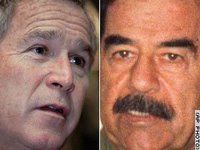 The US-backed special tribunal in Baghdad signalled Monday that it will likely delay a verdict in the first trial of Saddam Hussein to November 5. Why hasn't the mainstream media connected the dots between the Saddam's judgment day and the midterm elections?
The US-backed special tribunal in Baghdad signalled Monday that it will likely delay a verdict in the first trial of Saddam Hussein to November 5. Why hasn't the mainstream media connected the dots between the Saddam's judgment day and the midterm elections?Here's how the story was reported pretty much everywhere: "An Iraqi court trying Saddam Hussein for the killing of Shi'ite villagers in the 1980s could deliver a verdict on November 5, officials said, a ruling which could send the ousted leader to the gallows…"
A possible death-sentence for Saddam and his top lieutenants on November 5? Now, shouldn't that raise a few eyebrows somewhere? If you happen to have a calendar close at hand, pull it over and take a quick look. That verdict would then come, curiously enough, just two days before the midterm elections.
Continue reading Here
Study of Iraqi Dead Shocking, But Sound Science
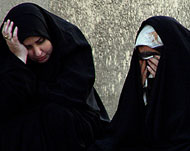 The Statistical Assessment Service a non-profit, non-partisan media research organization affiliated with George Mason University and committed to correcting scientific misinformation in the media - finds the study estimating 650,000 excess Iraqi casualties since American forces entered the country to be methodologically sound.
The Statistical Assessment Service a non-profit, non-partisan media research organization affiliated with George Mason University and committed to correcting scientific misinformation in the media - finds the study estimating 650,000 excess Iraqi casualties since American forces entered the country to be methodologically sound.In an analyis released today, STATS Director of Research Dr. Rebecca Goldin defended the research technique of cluster sampling behind the study, writing that "the methods used by this study are the only scientific methods we have for discovering death rates in war torn countries without the infrastructure to report all deaths through central means. Instead of dismissing over half a million dead people as a political ploy ... we ought to embrace science as opening our eyes to a tragedy whose death scale has been vastly underestimated until now."
She goes into great detail about both the strengths of the research, as well as the arguments against it.
- Prior Support from the Scientific Community:
While the Lancet numbers are shocking, the study's methodology is not. The scientific community is in agreement over the statistical methods used to collect the data and the validity of the conclusions drawn by the researchers conducting the study. When the prequel to this study appeared two years ago by the same authors (at that time, 100,000 excess deaths were reported), the Chronicle of Higher Education published a long article explaining the support within the scientific community for the methods used.
- The Methodology of "Cluster Sampling":
Cluster sampling is a well-established in statistics, and is routinely used to estimate casualties in natural disasters or war zones. For the Iraq study the researchers randomly chose people to interview about deaths in their families, interviewed a cluster of households around them, and then extrapolated the results to the whole population. There is nothing controversial in the method itself, though people can certainly question whether the sampling was done correctly.
- Attacks on Study are Ideological, not Scientific:
There has been a wealth of material on the web attacking the Lancet study. Most of it is devoid of science, and ranges from outrage at the numbers (it's impossible to believe it could be so high), to accusations of bias based on the authors' views of U.S. foreign policy. Interested parties such as the Iraqi government responded quickly by calling the numbers "inflated" and "far from the truth", rather than putting forward any real reasons why these numbers are unlikely to have occurred. President Bush, for one, says he does "not consider it a credible report."
You can read Dr. Goldin's analysis in its entirety Here
Source
US adopts tough new space policy
 The US has adopted a tough new policy aimed at protecting its interests in space and denying "adversaries" access there for hostile purposes. The document - signed by President Bush - also says "freedom of action in space is as important to the United States as air power and sea power".
The US has adopted a tough new policy aimed at protecting its interests in space and denying "adversaries" access there for hostile purposes. The document - signed by President Bush - also says "freedom of action in space is as important to the United States as air power and sea power".The document rejects any proposals to ban space weapons. But the White House has said the policy does not call for the development or deployment of weapons in space. However, some military experts warn that by refusing to enter into negotiations on space weaponry, the US is likely to fuel international suspicions that it will develop such weapons.
The 10-page strategic document states that the US national security "is critically dependent upon space capabilities, and this dependence will grow".
"The United States will preserve its rights, capabilities, and freedom of action in space... and deny, if necessary, adversaries the use of space capabilities hostile to US national interests," it says.
Source
Full Document
Wednesday, October 18, 2006
The worst in Iraq is still to come
 By Simon Tisdall
By Simon TisdallIn its external aspects, Iraq remains a live, occasionally explosive issue in the US and Britain, as last week's row over General Sir Richard Dannatt's thoughts on a British withdrawal showed. But the deepening chaos inside the country attracts less and less attention. Like sailors long missing at sea, the fate of ordinary Iraqis three years after the country was driven on to the rocks grows increasingly remote from those who precipitated the disaster.
In the US, Iraq is now primarily an electoral rather than a nation-building, humanitarian or counter-terrorism issue. With the Republicans fighting to retain control of Congress in next month's midterm polls, George Bush's Middle East freedom mission has become a hard-nosed numbers game.
The Lancet's politically damaging report that more than 650,000 Iraqis have died since 2003 was swiftly dismissed by the White House. But the fact that October is proving the cruellest month for American soldiers, with an average 3.5 deaths a day so far, is deadlier domestic ammunition for the Democrats.
On related fronts, both American conservatives and Arab reformers worry that, burned by its Iraq experience, the Bush administration is reverting to old thinking - containment, deterrence, and maintenance of the Middle East status quo. And in Britain as in the US, Iraq is now a handy tool in the nuclear proliferation debate. Tony Blair is derided for seeing weapons in Baghdad when, actually, they were in North Korea all along. So who, his opponents ask, can trust him on Iran?
Such political and strategic games reflect a changed state of mind. Although the troops are still there, much of European and US opinion now seems to feel it has entered the "post-Iraq" period. The world has moved on to other issues, it is argued. Relatively soon, both Mr Bush and Mr Blair will be gone. And media interest has diminished, partly because of the evident dangers to reporters but also because the "story" has grown repetitive.
But inside Iraq, the picture appears very different to those who still care to look. As daily sectarian bloodshed, militia anarchy and political incompetence reach unprecedented levels, it seems likely that the worst is yet to come.
One sign came last week when the Shia parliamentary majority rejected Sunni opposition and passed a law allowing partition into autonomous federal regions. It is but a small step from there to national disintegration.
Another grim omen was the indefinite postponement at the weekend of a long-awaited "national reconciliation conference", an initiative central to the prime minister Nuri al-Maliki's efforts for a new start. Almost simultaneously, Sunni insurgents, including al-Qaida, announced the formation of an Iraqi Islamic state.
Policymakers agree the US approach has to change. The argument is about how, and to what end. The focus of the former secretary of state James Baker's Iraq Study Group, currently examining the issue at Mr Bush's behest, is not how to make Iraq a glowing success but how to prevent it becoming a permanent failure endangering US interests. Options under discussion include asking Iran and Syria for help and containment via a phased withdrawal to friendly neighbouring countries.
"The starting point is to recognise that Iraq is not going to be a democratic, unified country that serves as a model for the region," Dennis Ross, the Clinton administration's Middle East negotiator, told the Washington Post. Whatever happened, the US should set a withdrawal timetable, he said. That sounds very much like Gen Dannatt's "lowered ambitions".
In a report for the Centre for Strategic and International Studies, Anthony Cordesman takes a more holistic approach reflecting Washington's responsibilities as well as its self-interest. He discusses a wide range of measures, including international military and economic incentives to facilitate Iraqi reconciliation. And he warns that new remedies are urgently required.
"Iraq is already in a state of serious civil war and current efforts at political compromise and improving security at best are buying time," he says. "There is a critical risk that Iraq will drift into a major civil conflict over the coming months ... The US cannot simply 'stay the course' and rely on existing actions and strategy. It needs new options."
Source
Monday, October 16, 2006
Poll: 16% believe Bush Administration told truth about 9/11
 A poll conducted last week by the New York Times and CBS news found that just 16% of Americans believe the Bush Administration is telling the truth about what they knew prior to the September 11, 2001 terrorist attacks on the United States.
A poll conducted last week by the New York Times and CBS news found that just 16% of Americans believe the Bush Administration is telling the truth about what they knew prior to the September 11, 2001 terrorist attacks on the United States.Poll participants were asked, "do you think members of the Bush Administration are telling the truth, are mostly telling the truth but hiding something, or are they mostly lying?"
53% of respondents indicated they believe the Bush Administration was hiding something, and another 28% reported that they think the administration is mostly lying "when it comes to what they knew prior to September 11th, 2001, about possible terrorist attacks against the United States."
Source
British hostages demand inquiry into Kuwait spying claims
 British "human shields" taken hostage by Saddam Hussein in the first Gulf war demanded a public inquiry today into allegations that the government put their lives at risk to allow a secret operation to go ahead.
British "human shields" taken hostage by Saddam Hussein in the first Gulf war demanded a public inquiry today into allegations that the government put their lives at risk to allow a secret operation to go ahead.They were among 367 passengers and crew seized by Iraqi troops when British Airways flight 149 landed in Kuwait hours after the invasion of the country on August 2 1990.
Their demand for an inquiry was sparked by new claims published by author Stephen Davis that the flight was being used to transport undercover agents into Kuwait.
At a press conference in the House of Commons today, crew and passengers described how around nine men joined the flight unannounced as it was delayed on the tarmac at Heathrow, then disappeared immediately after its arrival in Kuwait City.
John Major, the Conservative chancellor at the time, has previously denied rumours that the mysterious men may have been special-forces troops, insisting that no military personnel were on board.
But Mr Davis now says that he has obtained documentary evidence, along with interviews with up to six sources - including one of the men on board the plane and one of the operation's organisers - indicating that they were on a secret mission to gain intelligence on the movement of Saddam's troops.
He said that BA was wary of allowing the flight, bound for the Malaysian capital, Kuala Lumpur, to stop off in Kuwait for refuelling while Iraqi troops were massing on the border, but the airline was assured by a British embassy official that it would be safe to land.
Mr Davis alleged that this official was in fact the station chief for MI6, which was in charge of organising the operation.
Continue reading Here
Canada blocks bid by Arab countries for vote Israel's nuclear capabilities
 More than a dozen Arab countries were blocked by a Canadian motion in their bid to have a vote on a resolution labelling Israel's nuclear capabilities a threat on the final day of the International Atomic Energy Agency's annual meeting.
More than a dozen Arab countries were blocked by a Canadian motion in their bid to have a vote on a resolution labelling Israel's nuclear capabilities a threat on the final day of the International Atomic Energy Agency's annual meeting.The draft resolution, which also called upon Israel to join the Nuclear Non-proliferation Treaty, was blocked from going to a vote Friday by the Canadian delegate.
The final session of the UN nuclear watchdog agency's weeklong meeting did adopt a separate, non-binding resolution calling on all Middle Eastern countries to accept IAEA safeguards and take steps toward the establishment of a nuclear weapons-free zone. Israel and the United States were the only two countries that voted against it. Three countries abstained.
The measure calling Israel's program a threat, which was co-sponsored by Iran, was kept from going to a vote after 45 countries backed a no-action motion by the Canadian delegate, effectively adjourning the debate Friday evening.
Among those supporting the effort to block the vote were the United States, Israel, France, Germany and Britain. Those abstaining included China, Russia and Nigeria, among others.
The 15 Arab countries behind the resolution, which would also have been non-binding, had hoped to send a signal to Israel following its monthlong war with Hezbollah, which killed hundreds of people - most of them civilians - in Lebanon.
"Peace and nuclear weapons are two enemies - there is no cohabitation," said Ramzy Ramzy, head of the Egyptian delegation to the meeting and his country's ambassador to Austria.
In co-sponsoring the resolution, Iran was also seeking to counter criticism of its own nuclear program, which the United States and others insist is aimed at the production of atomic weapons. Iran insists it only wants to generate power.
"Iran...has always called for establishing a Middle East free of weapons of mass destruction...It is of profound regret that this issue is trapped in a vicious cycle," said Ali Ashgar Soltanieh, Iran's ambassador to the IAEA.
Arab countries at the annual conference have regularly threatened to submit such a resolution but in past years have opted instead to voice their concerns about Israel's nuclear program through a statement from the conference president, which carries less weight than a resolution.
The last time such a resolution was submitted at the annual IAEA conference was in 1991. It passed.
Israel neither confirms nor denies its nuclear status but is considered to be the only country in the region with nuclear weapons. Israel does not accept IAEA controls on its nuclear activities.
Israel's ambassador to the IAEA said efforts to bring security to the Middle East should be focused on peace efforts, not necessarily arms control.
"The fundamental goal in the Middle East, as in other regions, is obtaining regional peace, security and stability, not arms control per se," Israel Michaeli said.
The draft resolution was submitted earlier this week by 15 countries: Algeria, Egypt, Iraq, Jordan, Kuwait, Lebanon, Libya, Morocco, Qatar, Saudi Arabia, Sudan, Syria, Tunisia, the United Arab Emirates and Yemen.
Source
Australia : Mea culpa mate
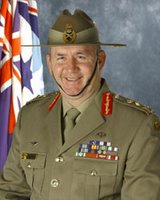 FORMER Defence chief General Peter Cosgrove has apologised to Federal Police boss Mick Keelty and now admits that the Iraq war has boosted global terrorism.
FORMER Defence chief General Peter Cosgrove has apologised to Federal Police boss Mick Keelty and now admits that the Iraq war has boosted global terrorism.Just days before the launch of his autobiography My Story, General Cosgrove told The Sunday Telegraph that his comments criticising Mr Keelty's view that the Iraq war had inspired terrorist attacks in Spain, were made just days after the event.
"At that time I just felt that call could not be made," he said.
"Things have moved on. I have got no reason to argue the weighty assessments that I am seeing.
"If people say that there has been an energising of the jihadist movement through the protracted war in Iraq - well that's pretty obvious."
Source
Saturday, October 14, 2006
The Ballad Of Ho Chang : Animation
Ho Chang rests his rifle across a branch and focuses its sights on the American infantryman. Ho Chang is fourteen years old. He is a guerrilla fighter, a skilled assassin, a sniper. Concealed high in a tree — a tree that a short time ago he climbed in play — he reaches and methodically plucks a leaf from his line of fire. Killing is his single remaining pleasure.… ( warning contains graphic images )
Source
Length 10 Min's
Source
Length 10 Min's
Cross row stokes Christian anger
 British Airways has asked a Christian member of staff to conceal her cross necklace because it contravenes the company's uniform policy. But has it added to a sense of unease among Christians?
British Airways has asked a Christian member of staff to conceal her cross necklace because it contravenes the company's uniform policy. But has it added to a sense of unease among Christians?Crosses may be a fixture around the necks of many Christians, and have even become a fashion accessory for A-list celebrities, but not everyone is happy to see them on display.
Heathrow check-in worker Nadia Eweida is on unpaid leave after refusing to cover up her cross necklace. "I believe that it is a very important issue on the matter of expressing Christianity and employees having their say in the way they express their faith," she said.....
.....David Cannings, chairman of Christians in Politics, which encourages people in public office to make their faith part of their work, said religious imagery was becoming marginalised.
"We think such ostentatious expressions of faith are starting to be pushed into the background in an attempt to treat people equally and I think there's a danger that faith will be pushed into the background at the same time.
"The debate is 'Is that what we want?' and I don't think we've answered the question.
"There's a danger we end up like in France where there's an absolute bar on any expression of faith in public society."
Source
When Evil Doing Comes Like Falling Rain
 The first time it was reported that our friends were being butchered there was a cry of horror. Then a hundred were butchered. But when a thousand were butchered and there was no end to the butchery, a blanket of silence spread. When evil doing comes like falling rain, nobody calls out 'stop!'
The first time it was reported that our friends were being butchered there was a cry of horror. Then a hundred were butchered. But when a thousand were butchered and there was no end to the butchery, a blanket of silence spread. When evil doing comes like falling rain, nobody calls out 'stop!'When crimes begin to pile up they become invisible. When sufferings become unendurable, the cries are no longer heard. The cries, too, fall like rain in summer.
--Bertolt Brecht
Here
Shameful legacy
 In the early 1950s, Mau Mau rebels murdered 32 people in an uprising against colonial rule in Kenya. Britain's response was brutal:
In the early 1950s, Mau Mau rebels murdered 32 people in an uprising against colonial rule in Kenya. Britain's response was brutal: 150,000 Kenyans were detained in camps where, survivors claim, prisoners were beaten, tortured, sexually abused and even murdered. Fifty years on, a handful of them are suing the British government. By Chris McGreal
Continue reading Here
US law experts question timing of Qaeda treason charge
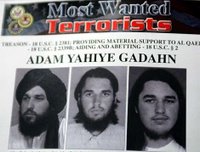 The first treason charge against an American since the World War II era has puzzled some law experts who suspect that political motives were behind the move less than a month before congressional elections.
The first treason charge against an American since the World War II era has puzzled some law experts who suspect that political motives were behind the move less than a month before congressional elections.Adam Gadahn, 28, was charged with treason Wednesday for appearing in Al-Qaeda propaganda videos, putting him in a small club of less than 40 people who have been prosecuted for betraying the United States.
Two other Americans who have faced justice in the "war on terror" since the September 11, 2001 attacks, "American Taliban" John Walker Lindh and suspected Al-Qaeda operative Jose Padilla, were never charged with treason, which can carry the death penalty.
The Justice Department announcement of the federal grand jury indictment against Gadahn, who is believed to be hiding in Pakistan, came weeks before the November 7 election in which President George W. Bush's Republicans hope to keep control of Congress.
"There's a real effort in the (Bush) administration to keep fear alive in the country," said Jonathan Turley, a George Washington University Law School professor.
"The timing of this case and the use of this charge seems to be a bit too coincidental with the election cycle," Turley said.
Source
Friday, October 13, 2006
Far from the cameras
Ha'aretz
Of course, the Jews as a people are not responsible for the violence of Israeli soldiers, but can someone who has been raised under Israeli occupation, ie. the occupation by a self-proclaimed jewish state, and tortured by Israeli soldiers, for making a sweeping generalisation of the sort?
On the other hand, we must all, as westerners, take responsiblity for the actions of our governments as well as those our governments support. The responsibility we have is to speak out and act against terror as practised by our governments and their allies. We think, just because it is far away, and we hardly see any of it on our TV screens, that it does not exist, or that it is minor as compared to attacks in our countries. Yet, Palestinians are abused every day by Israeli armed forces. These are acts of terror on innocent civilians by a colonising regime. To illustrate this last point, this from a Nobel Peace Prize, Shimon Peres:
When the abusive soldiers played with his cell phone, they unknowingly photographed themselves, and their pictures enabled the Military Police investigation unit to locate them. Muhassin's case is apparently the only one to be solved so far, out of eight complaints submitted last week to the Israel Defense Forces by the Israeli human rights organization B'Tselem, against soldiers for harassing Palestinians at the checkpoints since the outbreak of the recent Lebanon War. This week, indictments were filed in the regional military court against Sergeant H. and Sergeant Y. Euphemisms were used to describe details of the crime: The accused, while serving as soldiers in the IDF, behaved in a manner unbefitting their rank and status in the army. The Lebanon War, which grabbed all the public's attention for about a month, turned the West Bank into a gray area, prone to the fallout of shame, chauvinism and aggressive vengefulness from the IDF's inability to defeat Hezbollah.
"They kept shouting at me: 'We've caught you, ya maniac, ya Hezbollah.' I don't know, maybe they thought I was a terrorist, they were hitting me all the time, I don't know, they went crazy, I don't understand it, they entered my house and now they're killing me, who will stop them from saying that I wanted to steal a weapon, we know the Jews, we know them well, they think that they can do anything, we live as in a prison, we want to live, we want to live in spite of everything, the Jews talk about peace, what peace, these people like blood, if someone checks their blood type he'll find war, these are people with war in their genes. Afterward they complain that there are terror attacks. Why? From the pressure we live under. If I can't bring bread or milk home, what should I do? There's no way, there's no way."
"Each time the cup fell I was beaten mercilessly, so I tried to stabilize it on my head. When I succeeded, the soldier said: 'Now quiet, quiet, don't move, keep quiet, you bastard.' He aimed his rifle and shot at the cup. The soldiers were rolling with laughter and they applauded. I saw the shot. The soldier was about four meters away. He apparently hit the mark, because the soldiers applauded. I thought it was the end of my life, it's indescribable, I couldn't believe I was still alive, if I were to meet that soldier today I would kill him, I don't care, let them kill me, you only die once."
Of course, the Jews as a people are not responsible for the violence of Israeli soldiers, but can someone who has been raised under Israeli occupation, ie. the occupation by a self-proclaimed jewish state, and tortured by Israeli soldiers, for making a sweeping generalisation of the sort?
On the other hand, we must all, as westerners, take responsiblity for the actions of our governments as well as those our governments support. The responsibility we have is to speak out and act against terror as practised by our governments and their allies. We think, just because it is far away, and we hardly see any of it on our TV screens, that it does not exist, or that it is minor as compared to attacks in our countries. Yet, Palestinians are abused every day by Israeli armed forces. These are acts of terror on innocent civilians by a colonising regime. To illustrate this last point, this from a Nobel Peace Prize, Shimon Peres:
Vice Premier Shimon Peres voiced Thursday his support for a continuation of the construction projects in the West Bank settlements. Israel cannot be punished twice, the vice premier said, referring to the ongoing Qassam threat to the country on the one hand, and the restrictions imposed on settlers on the other. The settlers' children cannot be stopped from building their homes, Peres added, saying that this issue is one of Prime Minister Ehud Olmert's major problems, a problem that preoccupied former Prime Ministers Yitzhak Rabin, Ehud Barak and Menachem Begin in the past.
Thursday, October 12, 2006
Top UK General seeks Iraq withdrawal
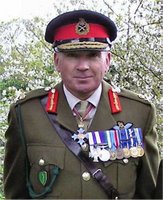 The head of the British Army has said the presence of UK armed forces in Iraq "exacerbates the security problems". In an interview in the Daily Mail, Sir Richard Dannatt, Chief of the General Staff, is quoted as saying the British should "get out some time soon".
The head of the British Army has said the presence of UK armed forces in Iraq "exacerbates the security problems". In an interview in the Daily Mail, Sir Richard Dannatt, Chief of the General Staff, is quoted as saying the British should "get out some time soon".He also said: "Let's face it, the military campaign we fought in 2003, effectively kicked the door in." Sir Richard added that any initial tolerance "has largely turned to intolerance. That is a fact."
Sir Richard, who took on his role in August, also said planning for what happened after the initial successful war military offensive was "poor, probably based more on optimism than sound planning".
He said: "I don't say that the difficulties we are experiencing round the world are caused by our presence in Iraq but undoubtedly our presence in Iraq exacerbates them." Sir Richard told the newspaper: "We are in a Muslim country and Muslims' views of foreigners in their country are quite clear."
"As a foreigner, you can be welcomed by being invited in a country, but we weren't invited certainly by those in Iraq at the time."
He added: "Whatever consent we may have had in the first place, may have turned to tolerance and has largely turned to intolerance."
Source
The Doomsday Code
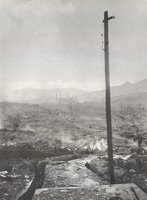 Tony Robinson investigates the people with powerful political friends in the White House, who are trying to bring about the end of the world. Julia Bard reports.
Tony Robinson investigates the people with powerful political friends in the White House, who are trying to bring about the end of the world. Julia Bard reports.Channel 4 Documentary - Runtime 100 Minutes - Here
Revelation, the last book in the New Testament, is filled with bizarre, violent and terrifying images. Its origins are unclear and its content is controversial. Some say it is the work of St John but many others believe he could not have been the author. But whoever wrote it, described apocalyptic visions of plagues, famines, wars, devils, wild beasts and rivers of blood. It is so strange and complex that scholars down the centuries have continually reinterpreted its message and meaning.
Today, though, a growing number of American evangelical Christians reckon they have cracked the code. These End Timers believe that every weird word of Revelation predicts real events. Like a Hollywood sci fi movie they say that any time now the world will end. And when it does, true believers in Christ will be whisked up to heaven in an event called The Rapture while non-believers are left behind on earth to face famine, war, terror and destruction as the forces of good and evil fight to the bitter end.
If this was confined to the personal beliefs of a few fundamentalists it would be of little significance but, says Tony Robinson, the leaders of the End Time movement are rich, well-connected and very powerful. Though the USA constitution enshrines the separation of church and state End Timers are frequent visitors to the White House. No one knows if George W Bush is an End Timer himself, but his policies are at one with those of the evangelical Right and his language is often apocalyptic, such as when he describes the 'war on terror' as 'the epic struggle of good and evil'.....
Worth watching if you have the time.
Wednesday, October 11, 2006
Way to go
From USA Today:
From Juan Cole:
More than 600,000 Iraqis have died by violence since the U.S.-led invasion in 2003, according to a study released today by researchers at Johns Hopkins University.
The figure is based on surveys of households throughout most of the country. It vastly exceeds estimates cited by the Iraqi government, the United Nations, aid and anti-war groups, and President Bush.
From Juan Cole:
This study is going to have a hard ride. In part it is because many of us in the information business are not statistically literate enough to judge the sampling techniques. Many will tend to dismiss the findings as implausible without a full appreciation of how low the margin of error is this time. Second, it is a projection, and all projections are subject to possible error, and journalists, being hardnosed people, are wary of them.
The New York Times report has already made a serious error, saying that deaths in the Saddam period were covered up. The families interviewed knew whether their loved ones were disappearing in 2001 and 2002 and had no reason to cover it up if they were. The survey established the baseline with a contemporary questionnaire. It wasn't depending on Iraqi government statistics.
Another reason for the hard ride is that the Republican Party and a significant fraction of the business elite in this country is very invested in the Iraq War, and they will try to discredit the study. Can you imagine the profits being made by the military-industrial complex on all this? Do they really want the US public to know the truth about what the weapons they produce have done to Iraqis? When you see someone waxing cynical about the study, ask yourself: Does this person know what a chi square is? And, who does this person work for, really?
Then Anthony Cordesmann told AP that the timing and content of the study were political. But is he saying that 18,000 households from all over Iraq conspired to lie to Johns Hopkins University researchers for the purpose of defeating Republicans in US elections this November? Does that make any sense? And, if Cordesmann has evidence that the authors and editor set their timetable for completion and publication according to the US political calendar, he should provide it. If he cannot, he should retract.
Walls of incompetence

ErasmusPC
And now, the city walls have come to a very sad next step. Padua in the North of Italy, receives many new non EU immigrants. The average in Italy is 5%, the average in the wealthy industrial and economically booming cities in the North is 10%. and in Padua, it is growing with one percent each year. Cheaper neighbourhoods are full with newcomers. At the same time, there is a lot of new drugs related crime from these neighbourhoods. And in stead of regenerating the urban areas, starting social, economic and education plans, the (socialist) mayor looked and learned from Berlin, Belfast and Jerusalem.
He decided to build a wall, the Via Anelli Wall, that separates the wealthy neighbourhoods from the less wealthy ones. A whole area with 1,500 residents is being cut off. According to the mayor, this is the way to prevent ‘French situations’. As far as he is concerned, the wall will be much longer. And again, we need an artist to start a protest by painting murals. One passage was left open in the wall around what is called the ‘African ghetto’. It has barbed wire and it is continuously under surveillance by police officers. Much like the infamous Checkpoint Charlie in Berlin during the Cold War.
Follow the money
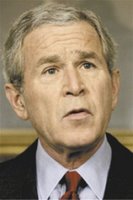 This article from April, 2002 certainly raises a few questions in light of the claimed nuclear test by North Korea...
This article from April, 2002 certainly raises a few questions in light of the claimed nuclear test by North Korea...'The US Government has announced that it will release $95m to North Korea as part of an agreement to replace the Stalinist country's own nuclear programme, which the US suspected was being misused.
Under the 1994 Agreed Framework an international consortium is building two proliferation-proof nuclear reactors and providing fuel oil for North Korea while the reactors are being built.
In releasing the funding, President George W Bush waived the Framework's requirement that North Korea allow inspectors to ensure it has not hidden away any weapons-grade plutonium from the original reactors.
President Bush argued that the decision was "vital to the national security interests of the United States". '
Of course the outcome of of all this wavering from the framework is to blame the very framework that you just wavered from ... or in simple terms ' blame Clinton'
The shifting of responsibility for everything and anything on to the ex president is becoming laughably predictable. It seems that there is no room for responsibility when November elections are just around the corner....
My source for the thought provoking reminder from 2002 is the excellent ICH
Oil, Smoke and Mirrors
Oil, Smoke and Mirrors is an independent 50 minute documentary on peak oil, 9/11 and the war on terror.
Source
Source
Tuesday, October 10, 2006
Monday, October 09, 2006
Big powers huff and puff over North Korea
 A storm of predictable condemnation rained down on the heads of North Korea's isolated regime in the wake of its first atomic weapons test today. The US, Japan, South Korea and others all described the move as a "provocation" that would be met with stern measures.
A storm of predictable condemnation rained down on the heads of North Korea's isolated regime in the wake of its first atomic weapons test today. The US, Japan, South Korea and others all described the move as a "provocation" that would be met with stern measures.China, which may feel particularly affronted given its protective attitude towards Pyongyang over the years, called it a "brazen act".
But the strong words did not disguise the weakness of the international community's position now that North Korea has finally crossed the line and indisputably become what it has long claimed to be - a nuclear weapons state. In short, the big powers can huff and puff, but there is not a lot new in practical terms that they can do. This development was expected. They simply couldn't stop it.
Article continues at the source
Incitement to hatred
 Watching the news or reading the papers, you'd think that Muslims were Britain 's No 1 problem. Everyone, it seems, is frantically racing to offer magic cures for this chronic disease. Islam and Muslims are only ever invoked as objects of fear and horror: terrorism, forced marriage, honour killing and fanaticism.
Watching the news or reading the papers, you'd think that Muslims were Britain 's No 1 problem. Everyone, it seems, is frantically racing to offer magic cures for this chronic disease. Islam and Muslims are only ever invoked as objects of fear and horror: terrorism, forced marriage, honour killing and fanaticism.Over the past few days, hostility to Muslims has dominated the media: from the saga of the Muslim policeman excused guard duty outside the Israeli embassy to the violent attacks on a Muslim-owned dairy in Windsor and Jack Straw's complaints about Muslim women who cover their faces. An ominous climate is being created.
Sinking in the Iraqi quagmire and lost in the Afghan labyrinth, Tony Blair turns on Muslims at home, demanding they clear up the mess he and his neocon allies have created. His communities secretary, Ruth Kelly, joins the rightwing French interior minister, Nicholas Sarkozy, in his war on multiculturalism. The hawkish John Reid launches his bid for the leadership of the Labour party by lecturing Muslim parents on how they should bring up their children. Image-obsessed David Cameron seeks to lure rightwing voters with a promise to "break Muslims ghettoes" and Straw seeks to revive his flagging fortunes by flexing his manly muscle at vulnerable female Muslim constituents.
Diplomatic talk about Islam "the great religion" aside, the truth is that Muslims have become, in the eyes of the media and political elite, a security threat and a convenient vehicle for exploitation and political opportunism. The aggressive racist discourse once confined to the BNP is now penetrating the mainstream. Instead of a serious effort to address the many problems Muslims face, attention is directed only at terrorism. While filling the air with talk of integration, citizenship, rights and obligations, the political elite and much of the media practise the logic of religious and ethnic categorisation, seeing nothing but race and religion. Muslims are not citizens; they are only Muslims. Their problems are not societal, but communitarian. It is they who must resolve them, while society stands guard.
Instead of facing up to their moral and political responsibility for combating ignorance, our politicians are doing the reverse. They are indulging in scaremongering, playing on the public's fears and exploiting people's lack of familiarity with the Muslim world. It is thus hardly surprising that 53% of Britons now see Islam as a problem.
With their politics of fear and demonisation, Britain and Europe seem to be on their way to substituting the Muslim problem for the Jewish problem. Muslims are now the object of the racist discourse that has in the past been targeted at Jews and black people. Under the impact of the horrors of the Holocaust, these prejudices have increasingly been forced into the shadows. The energy of hatred is today being reactivated against the Muslim "other" under the guise of combating terrorism and Islamo-fascism.
Hatred of the other has never been solely on racial grounds. It can also look to culture and religion for justification. The problem is that we are ill-equipped to confront this old-new phenomenon - we lack even the appropriate terminology to designate it. We could call it culturism, along the lines of racism. The two are intimately intertwined and equally dangerous and destructive.
Europe cannot afford to recreate the horrors of its not so distant past. It is time for those who believe in a tolerant Britain to come together in a broad coalition reflective of society's diversity. The political mercenaries and voices of hatred and bigotry cannot be allowed to dictate Britain's fate.
Source
Multicultural Britain
Why has the hijab or niqab suddenly become a problem in Britain? Why has the 'multicultural model' suddenly become a problem?
Are ghettos a new thing? Since when do orthodox jews mix with goys? More to the point, maybe, since when do aristocratic toffs or even the middle class mix with the working class? Class used to be the subject of a lot of strife. Has the class divide disappeared? I don't think so. Yet, the class divide is surely more of a social problem than what one chooses to wear or not. If women are forced to wear the hijab or niqab, then that is what we should be addressing, not those who choose to do so.
So, are more and more women choosing to wear hijabs or niqabs? I don't know, because I haven't visited Britain for over two years, and even then, I don't hang out in 'ghettos' because I am white,middle class. If it is the case, then maybe it is political, just as manipulation by xenophobic politicians and terrorist governments is political.
Ghettoisation is negative, in my opinion, but the solution isn't in assimilation, it's in integration. Integration isn't helped by images of neo-colonialist terror in muslim countries.
Most muslims in Europe don't live in religious ghettos, they live in social ghettos. There may be religious communities living apart from others within society even without social and economic issues, as I alluded to with respect to orthodox (or even liberal) jews. Whatever the dress code, be it a niqab or a beard and black hat, it shows a desire to seperate from others.
Furthermore, practising muslims may feel alienated from women and girls in mini skirts. The values of our society should be acceptance of people's choices not just those of one section of society. Some may claim Britain is a 'western' society, and so muslims must fit in and adopt western culture. The fact is, our colonial history has made us a multicultural society.
We can't go back on that legacy, and so we must accept, that muslim culture is part of British and European culture. Muslims didn't invade Europe. They came here because of our colonial history. We can't pretend it never happened and start over. We are still reaping the benefits of colonialism, and so we must accept, that we are not simply a 'western' nation, but a multicultural one.
Are ghettos a new thing? Since when do orthodox jews mix with goys? More to the point, maybe, since when do aristocratic toffs or even the middle class mix with the working class? Class used to be the subject of a lot of strife. Has the class divide disappeared? I don't think so. Yet, the class divide is surely more of a social problem than what one chooses to wear or not. If women are forced to wear the hijab or niqab, then that is what we should be addressing, not those who choose to do so.
So, are more and more women choosing to wear hijabs or niqabs? I don't know, because I haven't visited Britain for over two years, and even then, I don't hang out in 'ghettos' because I am white,middle class. If it is the case, then maybe it is political, just as manipulation by xenophobic politicians and terrorist governments is political.
Ghettoisation is negative, in my opinion, but the solution isn't in assimilation, it's in integration. Integration isn't helped by images of neo-colonialist terror in muslim countries.
Most muslims in Europe don't live in religious ghettos, they live in social ghettos. There may be religious communities living apart from others within society even without social and economic issues, as I alluded to with respect to orthodox (or even liberal) jews. Whatever the dress code, be it a niqab or a beard and black hat, it shows a desire to seperate from others.
Furthermore, practising muslims may feel alienated from women and girls in mini skirts. The values of our society should be acceptance of people's choices not just those of one section of society. Some may claim Britain is a 'western' society, and so muslims must fit in and adopt western culture. The fact is, our colonial history has made us a multicultural society.
We can't go back on that legacy, and so we must accept, that muslim culture is part of British and European culture. Muslims didn't invade Europe. They came here because of our colonial history. We can't pretend it never happened and start over. We are still reaping the benefits of colonialism, and so we must accept, that we are not simply a 'western' nation, but a multicultural one.
Friday, October 06, 2006
How Al Qaeda views a long Iraq war
 'A letter from Al Qaeda leaders found in Iraq shows that the group sees the war as a boon for its cause.'
'A letter from Al Qaeda leaders found in Iraq shows that the group sees the war as a boon for its cause.'In appearances across the US, President Bush has been campaigning against withdrawing troops from Iraq, arguing that to leave now would hand a historic victory to Al Qaeda and inspire new generations of jihadists to attack the US.
But a letter that has been translated and released by the US military indicates that Al Qaeda itself sees the continued American presence in Iraq as a boon for the terror network, which has recently shown signs of expanding into the Palestinian territories and North Africa.
"The most important thing is that the jihad continues with steadfastness ... indeed, prolonging the war is in our interest," says the writer, who goes by the name Atiyah. The letter, released last week, was recovered in the rubble of the Iraqi house where Abu Musab al-Zarqawi, former leader of Al Qaeda in Iraq, was killed by a US bomb in June.
If the letter is accurate, it provides a window into the group's strategic thinking on Iraq that differs starkly from the one the Bush administration has been expressing publicly.....
Here
War or Rumors of War?
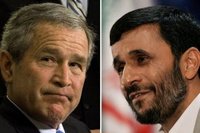 What's going on with the current bustle around U.S. naval stations? According to Time, the Navy has issued “Prepare to Deploy Orders” (PTDOs) to a strike group including minesweepers, a submarine, an Aegis class cruiser, and a mine hunter.
What's going on with the current bustle around U.S. naval stations? According to Time, the Navy has issued “Prepare to Deploy Orders” (PTDOs) to a strike group including minesweepers, a submarine, an Aegis class cruiser, and a mine hunter.Taken alongside disclosures that the chief of naval operations asked his planners for a rundown of how a blockade of Iranian oil ports would work, these military preparations led Time to conclude cautiously that the United States “may be preparing for war with Iran.”
Military officials downplay these recent moves as routine. But given the administration's recent history of manufacturing threat, misreading intelligence, and misrepresenting war plans, it is tempting to read between the lines—especially when increasingly hot rhetoric is coming from Washington.
Asked whether the United States will do anything to stop the Iranians from having a nuclear bomb, Vice President Dick Cheney paid lip service to diplomacy before emphasizing that “we think they should not have a nuclear bomb … the President has always emphasized no options have been taken off the table.” President Bush leveled some barbed criticism at Iran during his recent UN General Assembly address. Tehran continues to “fund terrorism, and fuel extremism, and pursue nuclear weapons,” he said. “Iran must abandon its nuclear weapons ambitions.”
What might push this combative rhetoric over the edge toward war? Iran's purported interest in nuclear weapons and its insistence on the right to enrich uranium have been portrayed as one and the same.
Continue reading at the source
Wednesday, October 04, 2006
Wanted: a world leader
 A Globe columnist recently wrote that "realists" such as Michael Ignatieff are right to give responsibility for world security to the West and its leadership to America. However, the U.S. leadership role is sadly collapsing before our eyes at a time when dangers abound.
A Globe columnist recently wrote that "realists" such as Michael Ignatieff are right to give responsibility for world security to the West and its leadership to America. However, the U.S. leadership role is sadly collapsing before our eyes at a time when dangers abound.The mess of Iraq is nowhere a good leader would have gone, and it's getting worse — in July and August, more than 5,000 Iraqi civilians died in sectarian violence in Baghdad alone, as Iraq careens toward break-up.
All told, there have been 2,700 U.S. dead and thousands maimed; financial costs in the hundreds of billions; new highs in Iran's prestige; the metastasis of jihadism; and, very pertinent to Canadian risk, deepened danger from jihadists in Afghanistan who revived when the U.S. yielded priority to its war on Iraq.
This is not what the Bush administration intended: U.S. intelligence agencies admit that the war on Iraq has aggravated the dangers of terrorism. The damage to confidence in the United States, even among most Americans, is startling as human rights take a tumble, and the truth spreads of the manipulative use of disinformation that the war's dishonest proponents in Washington and London foisted on their citizens.
The American reputation, including its reputation for competence, has plummeted around the world. Other responsible leaders don't try to debate this harsh set of outcomes; it is so tragically obvious. But, for them, it's bad news in dangerous times.
Continue reading Here
Condi Rice, 9/11 and Another Nest of Lies
 Secretary of State Condoleezza Rice may have committed perjury in her testimony before the 9/11 Commission in May of 2004. At a minimum, her testimony was a convenient mishmash of half-truths and omissions which served to paint the White House as innocent bystanders as the attacks of 9/11 unfolded. Certainly, her testimony omitted the fact that the two most senior intelligence officials in the nation delivered a stern warning regarding an impending terror attack two full months before 9/11.
Secretary of State Condoleezza Rice may have committed perjury in her testimony before the 9/11 Commission in May of 2004. At a minimum, her testimony was a convenient mishmash of half-truths and omissions which served to paint the White House as innocent bystanders as the attacks of 9/11 unfolded. Certainly, her testimony omitted the fact that the two most senior intelligence officials in the nation delivered a stern warning regarding an impending terror attack two full months before 9/11.Sunday's edition of the Washington Post carried a story titled "Two Months Before 9/11, an Urgent Warning to Rice." The story described a desperate attempt by CIA chief George Tenet and CIA counterterrorism chief J. Cofer Black to draw Rice's attention to the looming threat of an al-Qaeda strike against the United States. Tenet and Black insisted on a meeting with Rice on July 10, 2001. This meeting was first reported by Bob Woodward in his new book, "State of Denial."
"Tenet had the NSA review all the intercepts," read the Post story, "and the agency concluded they were of genuine al-Qaeda communications. On June 30, a top-secret senior executive intelligence brief contained an article headlined 'Bin Laden Threats Are Real.' Tenet hoped his abrupt request for an immediate meeting would shake Rice. He and Black, a veteran covert operator, had two main points when they met with her. First, al-Qaeda was going to attack American interests, possibly in the United States itself ... Second, this was a major foreign policy problem that needed to be addressed immediately. They needed to take action that moment - covert, military, whatever - to thwart bin Laden."
Continue reading Here
Considering the claim made by Bob Woodward. We should take another look at Condoleezza Rice facing 9/11 Commission. If Woodward is correct then clearly Rice lied. Will questions now be asked and clarity demanded ? I doubt it.....
Source
Further reading
Tuesday, October 03, 2006
President Musharraf: Daniel Pearl's killer was a MI6 spy
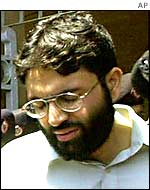 Pakistan President General Pervez Musharraf has disclosed that Omar Sheikh, who kidnapped and murdered American journalist Daniel Pearl and is now facing death penalty, was actually the British secret Agency MI6’s agent and had executed certain missions on their behest before coming to Pakistan and visiting Afghanistan to meet Osama and Mullah Omar.
Pakistan President General Pervez Musharraf has disclosed that Omar Sheikh, who kidnapped and murdered American journalist Daniel Pearl and is now facing death penalty, was actually the British secret Agency MI6’s agent and had executed certain missions on their behest before coming to Pakistan and visiting Afghanistan to meet Osama and Mullah Omar.General Musharraf’s book has also given a new twist to the whole drama of kidnapping and murder of American journalist as many believe here British national Omar Sheikh might use Musharraf’s memoir to plea his innocence after, quite surprisingly, Musharraf tried to give a clean chit to Omar despite his role in kidnapping which is punishable with death in Pakistan.
It has been reported that General Musharraf has written in his book that while Omar Sheikh was at the London School of Economics (LSE), he was recruited by the British intelligence agency MI6, which persuaded him to take an active part in demonstrations against Serbian aggression in Bosnia and even sent him to Kosovo to join the jihad.
At some point, he probably became a rogue or double agent.
The local media is discussing the possibility that Omar would use evidence from President Musharraf’s memoirs to save himself from the hangman. General Musharraf appeared to exonerate Omar Sheikh in his book In the Line of Fire.
Sheikh, 32, who was brought up in Wanstead, east London, has been on death row since 2003 after being convicted of orchestrating the kidnap and murder of the Wall Street Journal reporter.
The Times, which is carrying extracts of Musharraf autobiography has reported that General Musharraf appears to have changed his mind about the Briton’s guilt, saying he now believes that the man who beheaded the American hostage was Khalid Sheikh Mohamed, the mastermind of the 9/11 attacks. The Times has reported that Rai Bashir, Sheikh’s lawyer, said that he intended to use the memoir to force a new appeal hearing.
The Times report said General Musharraf appears to contradict the original claim that the British militant callously planned Pearl’s murder, saying: "Only later did I realise that Omar Sheikh had panicked because the situation had spiralled out of his control."
Bashir said: "After reading the book, if I feel necessary, I will quote the book in my arguments in favour of my client. It can be used as evidence." Three other men jailed for life for their part in the crime have lodged appeals.
Source
The former British cabinet minister Michael Meacher has been making exactly the same claim for some considerable time now.
Monday, October 02, 2006
Iraqi government divides after "bomb plot" foiled
 Sunni and Shi'ite political leaders in Iraq clashed publicly on Sunday over U.S. allegations a bodyguard for a top Sunni politician may have plotted an al Qaeda suicide attack on the vast Green Zone government compound.
Sunni and Shi'ite political leaders in Iraq clashed publicly on Sunday over U.S. allegations a bodyguard for a top Sunni politician may have plotted an al Qaeda suicide attack on the vast Green Zone government compound.Rifts between parties in the four-month-old unity government broke the surface as data indicated sectarian violence may have claimed a record number of victims last month and a new mass kidnap saw 26 meat factory workers seized by gunmen in Baghdad.
Police found a total of 50 bodies in the city over 24 hours.
Source
Colin Powell says he was fired by Bush Admin.
Colin Powell claims he was 'fired' by the Bush Administration, according part of Powell's official biography published in the Washington Post. Powell and the Bush Administration used the cover story that Powell resigned of his own accord from his position as Secretary of State
Source
Source

